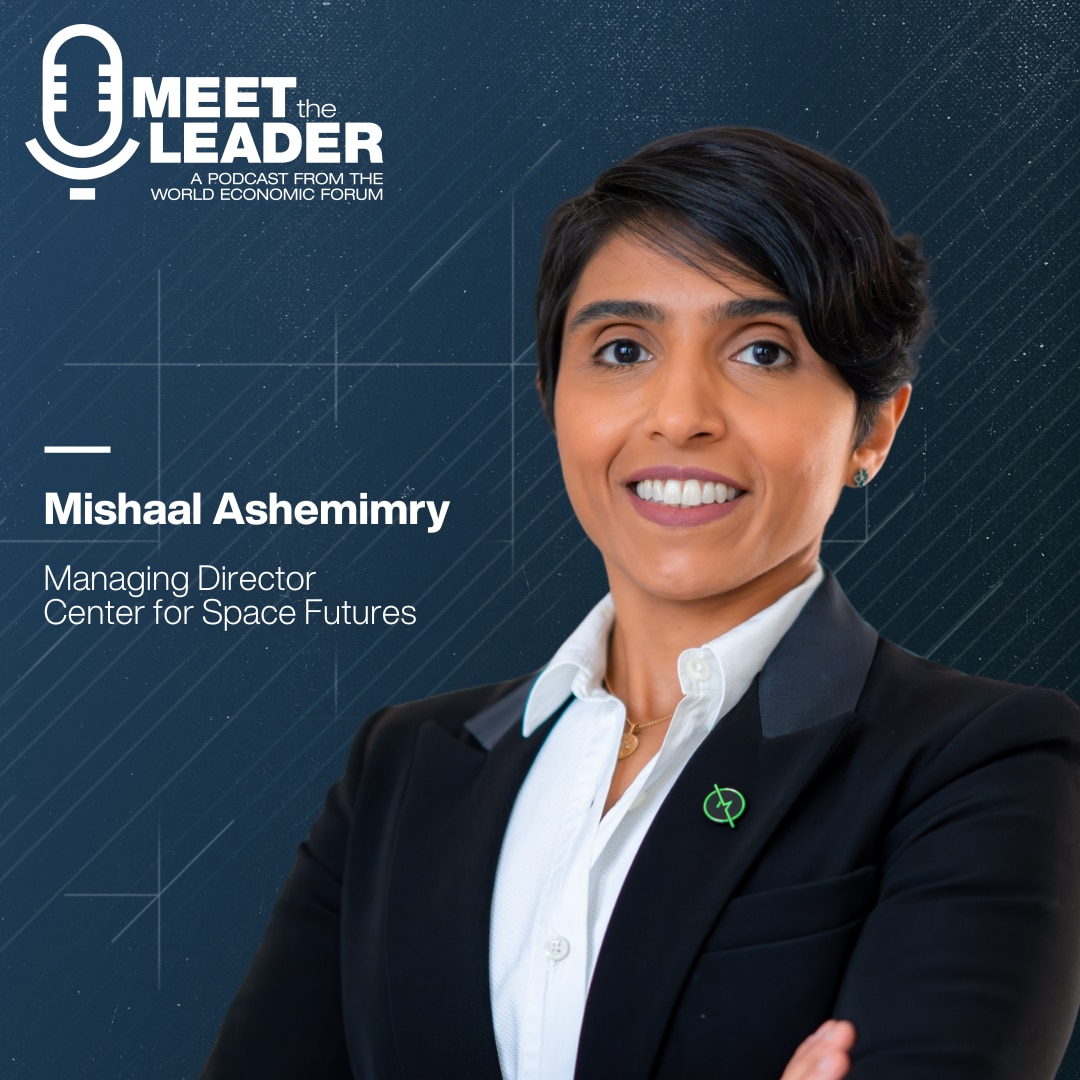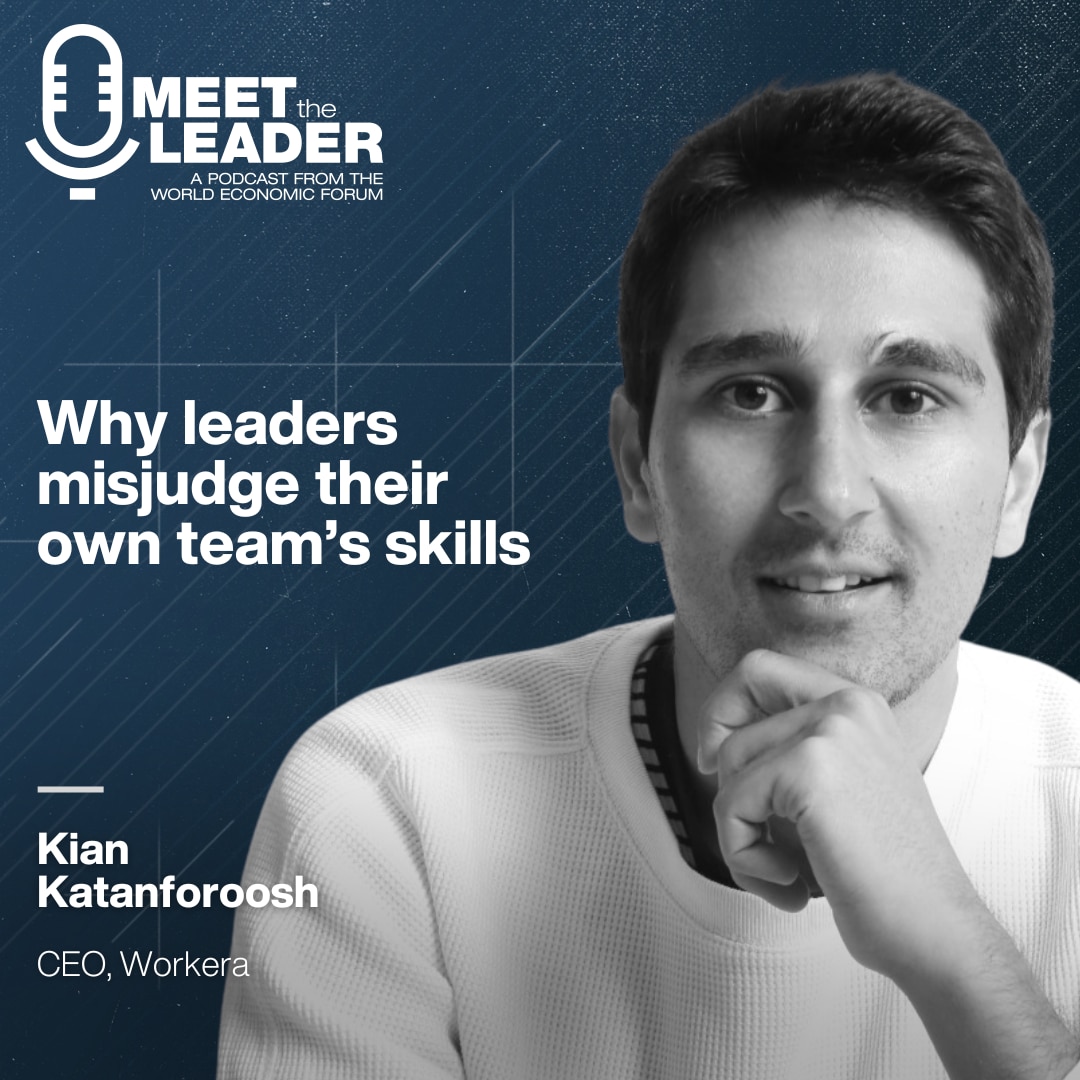What’s needed to restore land and protect economies: UNCCD’s Ibrahim Thiaw
播客文字稿
Ibrahim Thiaw, UNCCD: 50% of GDP is coming from natural resources, from land, from biodiversity, from, from nature. So, it would be good for humanity, for economy to restore that land. we also see now the links with migration, with conflicts It is not a biophysical issue. It is more a socio-economic issue
Linda Lacina, Meet The Leader: Welcome to Meet the Leader, the podcast where top leaders share how they’re tackling the word’s biggest challenges. In today’s episode, we talk to Ibrahim Thiaw who is closing out his role as head of the United Nations Convention to Combat Desertification (UNCCD) He’ll talk about something we don’t think enough about - protecting the land beneath our feet – and he'll also share a turning point as a child that shaped him as a leader to this day.
Subscribe to Meet The Leader on Apple, Spotify and wherever you get your favorite podcasts. And don’t forget to rate and review us. I’m Linda Lacina from the World Economic Forum - and this is Meet the Leader.
Ibrahim Thiaw, UNCCD: We need to restore 1.5 billion hectares of land by 2030. It's a huge task, not impossible, but it requires bringing public and private sector together in order to achieve that.
Linda Lacina, Meet The Leader: Up to 40% of the land on Earth is degraded –. It’s stripped of nutrients, can’t retain water, can’t support plant or animal life. That’s all thanks to a host of things like mining, deforestation, overgrazing, urbanization, and, of course, climate change. This impacts everything from our ability to grow food to grow our economy. After all, around half our GDP comes from our natural resources.
Was lucky to have a chance to talk to Ibrahim Thiaw. He will finish his time this month as the executive secretary of the United Nations Convention to Combat Desertification (UNCCD). But the work protect and restore the earth remains critical. He’ll share what he’s learned about this complex, global issue. He’ll also share details that go can get overlooked - like the vulnerabilities that can come for people in the world who don’t have bank accounts or even IDs, but for whom remains a sole asset.
He’ll also share the personal devastation that drought wrought on his own family and community when he was just 12 years old - and how that crisis gave him focus, purpose and shaped him as a leader.
We’ll get into all that - but first, he’ll tell us more about desertification. What it is and why it’s so important.
Ibrahim Thiaw, UNCCD: Desertification is loss of fertile land. In the context of an arid land, semi-arid land, those areas that do not receive much rain, that loss of land, fertile land, can be due to human activities or climatic conditions.
Linda Lacina, Meet The Leader: And for those not familiar, what is the UNCCD, the UN Convention to Combat Desertification.
Ibrahim Thiaw, UNCCD: The UN Convention to Combat Desertification is a global treaty. It is actually the only UN treaty dealing with land and drought. It's universal. Almost 200 parties. And the role of the secretariat is to facilitate discussions, to help organize conferences of the parties, the famous COPs. And so, there is a COP for desertification.
Just for everybody to understand, COP, meaning conference of the parties, which is the highest level authority decision-making body of the convention. And also, to organize some subsidiary bodies of the convention, to undertake some studies, to help the parties prepare the policy decisions when they come to COP, normally they should adopt some decisions, and to help parties in need to also tackle the issue of desertification at the national level in providing them with technical advice on how to prepare their programmes and so forth. So, it is a large mandate from the Secretariat of the UN Convention to Combat Desertification.
The public sector is doing quite good over the last few years in trying to restore degraded land. The private sector is still lagging behind
”Linda Lacina, Meet The Leader: So, when it comes to combating desertification, how, how are we doing? If you're going to give us a grade, what would that look like?
Ibrahim Thiaw, UNCCD: First of all, how are we doing in terms of how we manage land in the world. Up to 40% of the land on earth is already degraded. So, if this was a body, you can say that 40% of the body is already affected by a disease. So, it is not impossible, but it is a huge task to put that body back to health. And that is exactly what the parties are doing, which is essentially to put degraded land back to health in order to be able to produce again food, to produce vegetables, for pastoral activities, for mining activities and for all other activities that we do on land.
The techniques are very simple and they are very inexpensive compared to other techniques, combating climate change and so forth. But I have to say that the public sector is doing quite good over the last few years in trying to restore degraded land. The private sector is still lagging behind. It's only 6% of the investments in the world for land restoration that is coming from the private sector. And yet they are main players in terms of land management in the world, both in terms of degradation, but they should also be main players in terms of land restoration. So, it is certainly an area where we need to do much more in the world to restore the 40% of degraded land.
We estimate in the UN Convention to Combat Desertification that we need to restore 1.5 billion hectares of land by 2030. It's a huge task, not impossible, but it requires an industry, a new industry, bringing new technologies and all technologies, bringing small farmers and large landholders together, bringing public and private sector together in order to actually achieve that. It will be good for humanity in terms of the health of the planet. It will be good for the economy. We know that 50% of the GDP is coming from natural resources, from land, from biodiversity, from nature. So, it would be good for humanity, for economy to restore that land.
It would be good for the 3.2 billion people on earth that are affected by land degradation and who some, some of whom have nothing else than land as an asset. They don't own bank accounts. They don't even have I.D. cards. All they have is land. And Indigenous peoples from around the world are severely affected by this. Women and children are severely affected by this. But we also see now the links with migration, with conflicts. So it's a very complex issue. It is not a biophysical issue. It is more a socio-economic issue than it is actually a biological issue.
Linda Lacina, Meet The Leader: Help us understand what drives land degradation. What is contributing to this problem?
Ibrahim Thiaw, UNCCD: The main driver is food systems. We need to feed a growing population in the world. And the impact we are having in terms of producing our food is much higher on land. We are now 8 billion people, 3.2 billion of which are affected by land consume more or less 40% of it. But we are growing to nine, maybe 10 billion people.
More importantly, we are having we are having a growing middle class. So the higher the your income, the higher your footprint on land because you consume more water, you consume more energy, you consume more food, and you waste more food. So, it is therefore important that we consider this as one of the drivers.
Another driver of land degradation in the world is mining. We are using techniques of extraction of minerals that are not compatible with sustainable, we are not restoring the land, we are not rehabilitating the land after the mining. We do mining for 50 years. Only after the 50 years, we do decommissioning. We should do the decommissioning as we go so that by the time we go out of the site, we leave it in a good state.
Another driver of land degradation is essentially extraction. Extraction for rangelands, land conversion, for energy. Land conversion for animal feed and that is going to be one of the biggest drivers of land degradation in the world where we not only feed ourselves, but we feed animals. And these animals are also being used now, land is being used to feed that growing population of animals. So, it is not only for local consumption, but for international trade as well.
New technologies will also be needed in terms of research to produce more with less
”Linda Lacina, Meet The Leader: You mentioned that there are new technologies that can help us in this process of sort of combating desertification. Can you take us through some of these solutions, what are they?
Ibrahim Thiaw, UNCCD: The solutions are multiple. First, let's start with the low tech, because that is really, you know, available to local farmers. So they do have that low tech and they use it so you don't have to have a PhD to do land restoration.
But we also need high tech now. We need artificial intelligence. We need drones. We need all sorts of new tools that are available today in order to achieve the 1.5 billion hectares of land that cannot be done with manual work. You need, we will create a lot of jobs for that activity. Millions of jobs, green jobs will be created, but they will, they should have access to high tech, to new, new technologies. We should reduce the amount of water we are using for food production. We should reduce the amount of water we are wasting as wastewater, as end of the pipeline. So, all of that will be available to us through new technologies.
But more importantly, we also need to have to have more drought-resistant seeds. So new technologies will also be needed in terms of research to produce more with less. We will need twice as much food produced by 2050 as compared to now. And yet we have already degraded 40% of the land in the in the world. So how can we produce more with less? By using technologies. So how can we produce more and consume more and reduce the waste that we use? It is also by technology.
Sometimes access to renewable energy can be very helpful to farmers who do not have access to energy, therefore can lose up to 40% of their production post-harvest. That is called food loss for lack of energy. Some farmers produce food but cannot have the means of transport or the roads that will be taking them to the market. That also can be improved when you have more investments in infrastructure or new technologies. So, it is a combination of factors. It is not something that can be done by one sector. It is really different sectors that should come together.
Now, to make it even more complicated. We have situations of drought that are more frequent. They have always existed but the frequency is much higher and the severity is also higher. Now, when you have droughts in some countries it’s hell. They cannot produce food anymore. And you have humanitarian situations where they will need to be assisted. So it, again, uses new technologies in order to have early warning systems so as to inform them at least six months in advance, four months in advance, even one month in advance, if they are informed, they will prepare better, prepare themselves. So preparedness is something.
So you will see technology is coming from different angles and it is necessary to use them and to make a good use of the AI that is available to us now.
Taxpayers’ money is being used to actually destroy the very nature which produces 50% of our GDP
”Linda Lacina, Meet The Leader: You mentioned there are some really key and urgent things that need to happen to meet some 2030 goals. Can you take us through what needs to happen?
Ibrahim Thiaw, UNCCD: What will need to happen is change of policies. We still have a lot of negative subsidies that are destroying the environment and destroying the land and the soil. So, we need to actually repurpose that. That can be done by change of policies through governments. Taxpayers’ money is being used to actually destroy nature, the very nature, which produces 50% of our GDP. So that is something that certainly is not going right.
So that is one thing. The second one is for the private sector to finally understand that investing in land restoration is not philanthropy. It’s not charity. It is to invest in their own land in order to sustain the productivity and the production, in order to make sure to make sure that they have a 50-year horizon rather than just a ten-year horizon through extraction. And then after that extraction, they will move to another land. There is no land reserve left in the world today.
So, it is important that we all understand, that there is this hardly any private sector that has no relationship with land. Whether you are in the mining or agriculture or tourism or transport or energy and so forth. So, it is important that they invest massively on their own land, not on someone else's land, on the land that is producing goods or the land that is used for the transport or energy and so forth. So yes, change of policies is the number one thing that we need to do today in order to have a massive impact by 2030.
Linda Lacina, Meet The Leader: And what types of policies are we talking about?
Ibrahim Thiaw, UNCCD: Both at the government level, which I talked about subsidies, it is also creating incentives for the private sector to invest in the land. If the land does not belong to the private sector, what relationships are there? What are the concessions that need to be negotiated between that company and the land-owners in order to give a longer term horizon to the investor to secure that investment?
So, it is important, therefore, that we have regulations for that. Policies will also be to address the issue of drought that I mentioned earlier. We cannot just wait until the next drought hits. It is important that we get prepared. It is important that we use early warning systems. So, the early warning systems, the early warnings for all initiative of the UN Secretary-General comes very much here as a contribution. The new technologies that are available can also help. So, it is important that we look at that from that perspective, not leave it to those sectors only in charge of the environment. But to you is to see it as a collaboration between different sectors between agriculture, water, energy. Drought hits everybody, so it is important that you have a comprehensive approach to that.
So again, inclusiveness, making sure that you take into account that the food farmer who will be hit hard with the next drought or will be hit hard by land degradation in the world. You know, millions of people, hundreds of millions of people will be fleeing from their area. So, the massive migration that we are concerned about is probably going to increase unless we take care of land degradation, unless we restore the land and give them the opportunity to produce on their land and stay home rather than be tempted to move to the next city, to the next country or further afield.
The number of conflicts that we see in the world today are competition for access to fertile land and water also can be preempted if we restore more land because you expand the envelope and you give them opportunity to produce in a larger patch of land. The extremism that we are seeing in some parts of the world, like the Sahel or Somalia, all of that can be fueled by despair. Which is essentially due to the fact that they cannot produce any more. So, where they will get the next $100 will be their boss. So, it is important that you secure them. You give them the dignity so as to prevent all of these issues that we are talking about.
So, the response is not only military in terms of security. The response to security issues today is to invest in water, to make sure that water is available, to invest in land. The forest fires that we see, you cannot shoot on a forest fire. Yet it is a major security issue. You cannot shoot on a dust storm. Yet, it is a major security issue. So, security issues are coming now, environmental degradation-induced security issues are coming now as a big issue to be addressed by security officials.
It is important that you have coherence at the national level and a more integrated approach
”Linda Lacina, Meet The Leader: This was a, you mentioned the COP, the Land COP that happened in December, this was a triple COP year. And you have talked about this sort of amazing moment that there was for the world to think about how these things are integrated. How biodiversity, how climate and land, how they are integrated, and how they fed into one another..
What needs to happen to create awareness so we don't lose that sensibility?
Ibrahim Thiaw, UNCCD: First, the first action should be at the national level. It is certainly at the national level that you have one single government, that you have one single policy that can be implemented. Policies are usually at the national level.
The same country may have ratified multiple conventions – in this case, there are three conventions that you are referring to, but it is one government. So instead of having three reports, instead of having three policies, one called NDCs [Nationally Determined Contributions], one called NBSAPs [National Biodiversity Strategy and Action Plans], one called LDN [Land Degradation Neutrality]. These are all acronyms of sorts, a soup of acronyms.
There is no way you can address the issue of climate change in any country in the world without addressing the issue of water and land degradation, without addressing the issue of biodiversity, because that is lifeline of our economies and of human wellbeing in the world.
”So, it is therefore important that at the national level you have one integrated policy, one integrated report. Some countries are doing it. They will still participate two or three different COPs, but they will come with a very coherent view. Because there is no way you can address the issue of climate change in any country in the world without addressing the issue of land and water and land degradation, without addressing the issue of biodiversity, because that is the basis or the lifeline of our economies and of human wellbeing in the world.
So, it is regardless of the number of COPs. And there are hundreds of global treaties or regional treaties dealing with environmental issues. So, it's not only the three that we mentioned. It could be chemicals conventions, there are oceans-related conventions, the land-related regional treaties and so forth. But it is important that you have coherence at the national level and a more integrated approach.
Linda Lacina, Meet The Leader: You experienced drought and famine growing up, you had a personal experience with this growing up in Mauritania. Can you talk a little bit about that experience?
Ibrahim Thiaw, UNCCD: It was very dramatic. I was 12 years old when the first severe drought hit the Sahel and the impact it had on my own family, in my own community and my own country, not talking about other countries in the Sahel, was just terrible. In one year, you lose your livestock. The same year you lose your food production systems. The same year you have new diseases that you did not know. And even having water to drink is problematic in some parts of that region. So, and you are not prepared. You never saw that, your generation had never had -- there have been droughts before. But that drought was so severe that it impacted dramatically.
So what it did was to dislocate families. Some families have never been really reunited again because of the migration that I talked about earlier. People are forced to flee to the next city. And you see a number of suburbs and shanty towns being created in a number of countries, and it disrupted economies. Of course, there have been international aid, food aid and so forth, but there is no food aid that can restore your dignity. And it was severe. And unfortunately, a number of people had no choice but to commit suicide because they could not just watch what was happening to their children or to the animals or to their families or to their neighbours.
There is no food aid that can restore your dignity
”Linda Lacina, Meet The Leader: Was there a turning point moment? I'm sure this shaped you in a number of ways, but was there a moment when you thought, I'm going to be an agent of change here.
Ibrahim Thiaw, UNCCD: It was that time. It grew on me saying, what can you do to change this situation. Because it didn't stop in that year. I mean, you had dry years, successive dry years and droughts and desertification as the population grows.
So essentially from that moment, that moment was a turning point in terms of ecology, in terms of food production, in terms of capacity to produce enough food and healthy food for the families. But it also came as a shock to me to say, what can you do? Certainly, there's a solution. That was the question, the answer to me.
I was only 12 years old, but never did I change my mind that from that moment I have to do something and I never change my mission or my direction of travel. I have always kept that direction and saying I will dedicate my life to global environmental issues. And I never changed my mind and I'm glad I did so.
Linda Lacina, Meet The Leader: So how has working at the UNCCD changed you as a leader? Is a way that you approach a problem or situations that someone with a different background might not do?
Ibrahim Thiaw, UNCCD: Yes. At the beginning of my career, my international career, by the way. At the beginning of my international career, I worked at IUCN [International Union of Conservation of Nature] and before that, I worked for my own government in Mauritania. And I remember when I was at IUCN and I was considering these UN meetings as boring. They were slow, there were long and I was telling my friends, I cannot spend one hour just agreeing on a comma or a footnote because it can be painful in these negotiations.
But of course, I joined the UN, I mean, a bit later in my in my career and I moved to UNEP and before I moved to the UNCCD. So, I sort of get used to these international negotiations and I do understand. And to respond to your question, having 197 parties in the same room, negotiating issues of land and drought and water and how that affects communities is fascinating because whether you are coming from the Pacific or from the Caribbean or from Africa or the United States, you have the same ambition and you understand that you cannot manage the situation by dealing only intramural, within your territory, within your nation. So therefore, it is absolutely critical to agree amongst ourselves.
But how can you bring 197 parties together to agree on anything, given the diversity of cultures, approaches of views and also interests to be, you know, to be honest. This has serious economic implications. We are talking about international trade. We are talking about economy. We are talking about food systems and food security from around the world.
I’m very proud that as Secretariat of the UNCCD, we were able to bring these parties and to talk about the last Conference of the Parties, which was held in Saudi Arabia in December [2024], which was the largest ever conference of the parties organized by the UNCCD and brought together, from our own registration in the Blue Zone, we had more than 20,000 people. But overall, with the Blue and Green Zone, the Saudis are now talking about 80,000 people because they had much more in the Green Zone.
So that was remarkable in terms of outreach, in terms of decisions and in terms of mobilization of financial resources to support the poorest countries in the world. So, I think it's only through these Conferences of the Parties that it can be achieved. As difficult as they may appear and as slow as they may appear to some – and I do understand some frustration saying these are slow, these UN meetings – but they are irreplaceable.
And what we what we were able to do in Saudi Arabia was absolutely remarkable. We brought 400 business leaders together, with probably 3,000 NGOs, with another 10,000 officials from governments together to discuss issues like Indigenous peoples, the role of women and how women's access to land and land ownership. Very difficult issues that are not easy to, to discuss in a in a given country. But bringing them together is even more complicated.
So, yes, I was, it's quite amazing how we were able to actually do this together, together with our parties, of course, this is not for the secretariat to decide and to make decisions, but we were able to create the platform and to bring everybody together to, to have that discussion.
The elephant that is willing to drink and that is thirsty will not be disturbed by the noise of the birds around him
”Linda Lacina, Meet The Leader: I have exactly one minute left with you, sir. So very quickly, how do you stay focused? You say you can't get lost in the footnotes, in the punctuation marks. How do you stay focused on the change that really matters?
Ibrahim Thiaw, UNCCD: You know, I do have my plans and I try to stay on that. I told you about my own career and how I stayed focused on that career. That is basically the mindset I have. Focus. And I always use one African proverb which says in French, I don't know how to translate, but the elephant that is willing to drink and that is thirsty will not be disturbed by the noise of the of the birds around him. It is, you hear them, but you focus because your intention is to get to that water point and to drink. Otherwise, you may not achieve your, your ambition. So, I am, I'm an elephant and I'm focused.
Linda Lacina, Meet The Leader: Thank you so much Ibrahim.
And thank you so much to our listeners and our viewers. For more video podcasts, go to the World Economic Forum's YouTube page. And for more podcasts and transcripts, go to our website at wef.ch/podcasts.
Forecasts say we’ll need to double food production by 2050 - a tall order given 40% of the earth’s land has been degraded over decades by mining, unsustainable farming and climate change. The head of the United Nations Convention to Combat Desertification (UNCCD), Ibrahim Thiaw, takes us through this complex issue that impacts economies, human well-being and global security. He breaks down what’s needed to restore 1.5 billion hectares of land and the policies and technologies that can make a difference. He also shares how drought devastated his family and community when just a child and how the destruction and despair he witnessed inspired him to dedicate his life to environmental issues. As he closes out his role as executive secretary this summer, he shares how leaders can sharpen their focus on the issues that matter most.
分享:
更多集:
每周 议程
每周为您呈现推动全球议程的紧要问题(英文)





